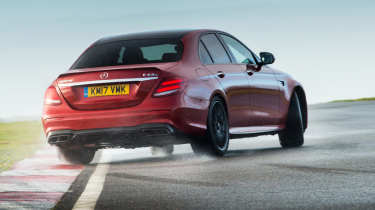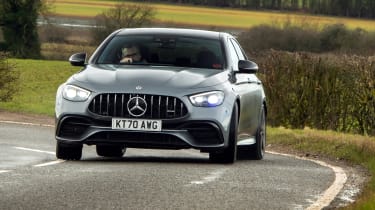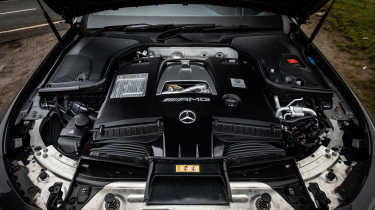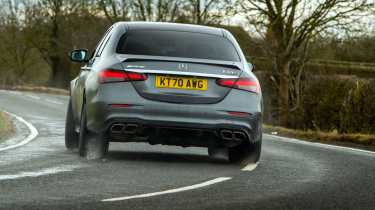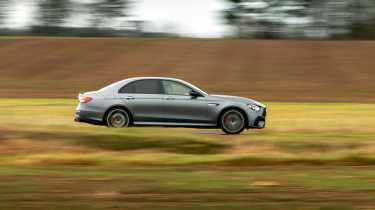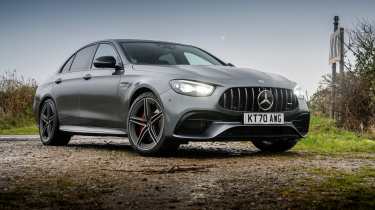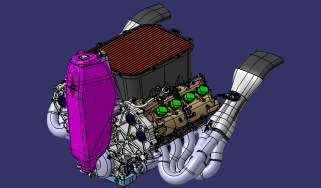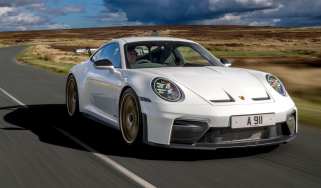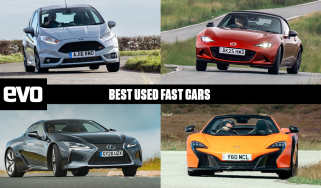Used Mercedes-AMG E63 (W213, 2017 - 2023) review – a V8 supersaloon for hot hatch money
The W213 Mercedes-AMG E63 S isn’t just a German four-door muscle car – it’s exciting, edgy and captivating too
The Mercedes-AMG E63 used to be the ideal German muscle car to sit in the fast lane of an Autobahn, scaring other cars out of its way as it dispatched hundreds of miles with a plush interior, comfortable seats and a distant rumble from its oversized V8 engine in front of you. It seems no one had told AMG’s engineers though, because it's just as gifted down a tortuous B-road as it is on a derestricted highway. It might well be big and heavy, but it’ll move with the agility of a car 600kg lighter while being genuinely entertaining in the process.
Its vast range of abilities can be partly attributed to its de-coupleable four-wheel-drive system, something that has since been mimicked around the industry in rivals such as the BMW M5. It’s a trait that stops the W213 E63 S AMG from just falling into the mould cast by previous generations, and one that helps it be a deeply desirable do-it-all performance car, rather than just an overpowered E-class. It went off sale in 2023 and while it's a shame there's still no replacement in sight, there are some incredible deals to be had on the classifieds...
> Mercedes-AMG E63 S Fast Fleet test – six months in the 600bhp BMW M5 rival
Engine, gearbox and 0-62mph
Since its first appearance in the AMG GT, Mercedes-AMG’s 4-litre twin-turbo hot-V V8 engine became ubiquitous throughout the range. It's an engine that demonstrates how, perhaps more than any other manufacturer, Mercedes-AMG emerged from the transition to turbocharging with its identity firmly intact. Where BMW M and Audi RS cars lost some of their snarl and bite, AMG’s V8 left little on the table with its noise, response and muscularity.
More reviews
In-depth reviews
Long term tests
Reviews
- Used Mercedes-AMG E63 (W213, 2017 - 2023) review – a V8 supersaloon for hot hatch money
- Mercedes-Benz E55 AMG (W211, 2003 - 2006): review, specs and buying guide
- Mercedes E-class 2024 review – plug-in hybrid E300e tested
- Mercedes-AMG E53 2021 review – brimming with tech, but missing the charisma of an M550i
- Mercedes E-class 2020 review – new E450 a smooth operator
- Mercedes-Benz E-class review – executive tour-de-force still one to be reckoned with
In the E63 S, it puts out 603bhp between 5750 and 6500rpm and a whopping 627lb ft of torque between 2500 and 4500rpm. The E63 S is gut-wrenchingly fast as a result, as AMG E-classes always have been, happy to accelerate dragster-like right up to its limited 186mph top speed. But unlike previous iterations, the W213 deploys its substantial outputs with controlled fury thanks to its 4Matic+ four-wheel-drive system. This may be at odds with AMGs of yore, but the results are transformative. The E63 muscles its way along without pulling any surprises, rewarding with its crisp steering and taut chassis as if it’s smaller and lighter than it really is. There’s even scope to play within the four-wheel-drive safety net, which allows some throttle adjustability before sending more drive to the front axle to help pull the car straight.
All E63s use a nine-speed automatic gearbox that Mercedes calls Speedshift MCT. However, rather than employing a torque converter to transfer drive from the engine to the transmission, it uses a pack of ‘wet’ clutches for sharper shifts with more of a discernable thump.
The results of the all-wheel drive are clear when you look at the acceleration times. Officially, the 1880kg saloon accelerates from 0 to 62mph in 3.4sec. When we timed the E63 S with our own gear, we recorded a 0-60mph time of 3.4sec. That’s 0.1sec faster than the 0-60mph time we logged in a Ferrari 599 GTB or a F430 Scuderia. And that’s in a big saloon car.
Estates are 0.1sec slower than the saloon, which makes little to no discernible difference on the road, and all cars have a limited top speed of 155mph. What on-paper numbers don’t tell you is the unending punch that the E63 S’s 627lb ft of torque gives it at any speed and at any revs. This AMG twin-turbo has always been impressive at minimising turbo lag and in the E63 S is no different, hitting its plateau of torque with almost no delay.
Ride and handling
If you have cash to burn on tyres, Drift Mode disables the E63’s safety electronics and diverts all power to the rear for wonderfully controllable slides. The standard E63 has less firepower (563bhp and 553lb ft) and does without the dynamic engine mounts, electronically controlled rear diff, uprated brakes and Drift Mode of the S. Naturally, most buyers opted for the flagship (we would, too), which subsequently became the only model available when the E63 was updated in 2020.
The mid-cycle update gave the E63S more than just a new nose, as it’s driving experience was also updated to provide a slightly different feel to the previous version, albeit one that’s no less exciting. This said, it is much less muscle car than before, and gave up the childish pops and bangs except when in the sportiest driving mode. There’s also more of an obvious augmentation to the engine note through the cabin’s speakers, to the point where if the car sounds an alarm (due to various factors like the collision warning system or parking sensors) the engine note almost entirely disappears.
Adding to this sense of restraint is the E63S’s ride quality, which is much much more compliant than it used to be. This makes it a more relaxed car to drive at normal speeds. It no longer crashes into bumps or feels brittle like the old car sometimes did, yet the scrub on full lock and propensity to sniff out cambers and tramlines is still there, suggesting it’s just as focused as before, even if the dampers have been toned right down.
The good news is that in Sports+ and Race modes, the dampers reinstate the stiffness that’s been dialled out in other modes, meaning that the E63’s incredible sharpness and poise is maintained – it’s just more nuanced than before. Now more than ever, it makes effortless progress down A-roads and motorways, but is then explosive and energetic on twistier tarmac.
Its real potency can be attributed to its engine. There’s masses of low-down grunt, typical of a forced-induction motor, meaning the whole car never feels as heavy as its quoted figures when you accelerate. What’s not typical of a turbocharged engine is that there’s very little turbo lag. You don’t have to be wary that there might be a heap-load of unexpected power unleashed moments after you press the throttle. Instead the delivery is linear and practically instant.
The engine’s delivery, combined with the drivetrain, makes the E63 an incredibly confidence-inspiring and natural car to drive quickly. The steering, although it doesn’t exactly chatter with feedback, is crisp, fast and allows you to react appropriately to the chassis, further helping you tune into driving the car. Not only is the E63 far more alert and agile than you’d expect of a car this size, it offers up a thoroughly enjoyable, deeply involving and exciting drive too.
Running costs and what to look out for
The W213 E63 hasn’t sprung any serious reliability issues to speak of just yet. Some have reported jerky shifts from the car’s standard-fit nine-speed MCT gearbox, which uses a pack of wet clutches to transfer drive rather than a torque converter. A software update can sometimes cure this, but an MCT in tip-top shape still can’t match the smoothness of a traditional automatic. The E63 also tends to crab and shimmy at low speed near full lock; this is a characteristic of the car’s geometry, and not recognised as a fault by Mercedes. Instead, the firm suggests that owners switch to winter tyres to mitigate the issue in cold weather, when it tends to be at its worst. A band-aid, in other words.
If you look at the E63 as a practical five-seat saloon or vast estate car, then it is not a cheap car to run. Think of it as a rapid, viciously accelerating missile of a car, which it is, then it’s amazingly cost-effective. Officially, the big AMG is rated at 23.2mpg on a combined WLTP cycle. The estate, which is 105kg heavier, is even less economical at 22.8mpg.
If you’re going to partake in the sort of sideways shenanigans this car encourages, you’re going to wear out the rear tyres rather quickly. A pair of 20-inch, 295-section, 30-profile Michelin Pilot 4 S tyres for the back wheels will set you back around £540. The 265/35 20 fronts are cheaper, around £488 a pair, but it’s unlikely you’ll need those quite as frequently
What to pay
As is usually the case with used German supersaloons, previous owners have already taken the sizable depreciation hit so that you don’t have to. You’ll pay around £50,000 for an early 30,000-mile E63 S today, which sounds like a bargain for what was a near £90,000 V8 express when new. With its revised suspension, design and tech, the facelifted model is far more expensive; don’t expect much change out of £75,000.
If you have the budget, it may be worth considering if only for its more compliant chassis, which gives the car a much wider bandwidth. The V8 soundtrack was neutered slightly by the addition of a petrol particulate filter, but that trademark rumble is just an aftermarket exhaust away. Opt for an early non-S car and you can find examples for less than £40,000, but spending a little more is wise should you be keen to avoid unwanted bills.
Mercedes-AMG E63 S specs
| Engine | V8, 3982cc, twin-turbo |
| Power | 604bhp @ 5750-6500rpm |
| Torque | 627lb ft @ 2500-4500rpm |
| Weight | 1935kg |
| Power-to-weight | 321bhp/ton |
| 0-62mph | 3.4sec |
| Top speed | 155mph (limited, 186mph as an option) |
| Price new | £88,295 |
| Value today | From £50,000 |
